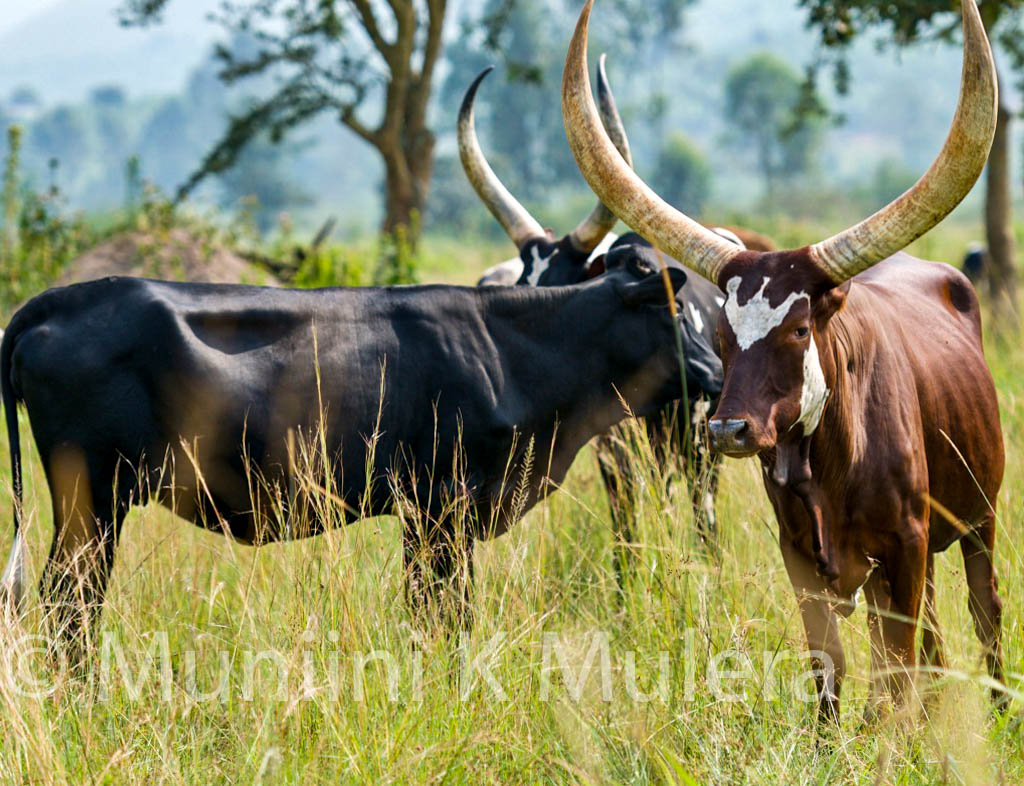Our ancestors had a counting system whose terminology was similar to or shared roots with that of Bantu language nations all over Africa. It appears that there were words for quantities/amounts up to, at most, ten thousand. It is very unlikely that there was an item that needed enumeration in numbers exceeding ten thousand.
According to Omugurusi Festo Karwemera, who was the leading authority on the language and traditions of Abakiga, very large numbers of things would simply be referred to as obutabarika (uncountable), oburooro (poultry lice), omuna (a climbing plant with numerous small flowers), or obuhumbi (whose meaning I do not know.)
For example, a person found counting omugusha (sorghum plants or its seeds), which is considered uncountable, would be declared to be embura mukoro (idle with nothing better to do.)
However, the arrival of Arabs and Europeans in the Kigyezi and Ankole introduced the need for counting very large numbers. So, new words were introduced into the vocabulary.
|
Number
|
Word(s)
|
|
1
|
Emwe
|
|
2
|
Ibiri
|
|
3
|
Ishatu
|
|
4
|
Ina
|
|
5
|
Itaano
|
|
6
|
Mukaaga
|
|
7
|
Mushanju
|
|
8
|
Munaana
|
|
9
|
Mwenda
|
|
10
|
Ikumi
|
|
11
|
Ikumi neemwe (ikumi na emwe)
|
|
12
|
Ikumi neibiri (na ibiri)
|
|
13
|
Ikumi neishatu (na ishatu)
|
14…...19 (words as above, substituting the respective numbers)
20 – makumi abiri
21 – makumi abiri n’emwe ---- and so on till:
30 – makumi ashatu
31 - makumi ashatu neemwe (na emwe) ..............
40 – makumi ana, makumi ataano, makumi mukaaga (nkaaga), makumi mushanju (nshanju), makumi munaana (kinaana) makumi mwenda (kyenda)…. And so on until 99 (makumi mwenda na mwenda or kyenda na mwenda), followed by 100 (igana,) which is also called “kikumi.”
Key numbers to remember:
|
Quantity (amount)
|
Single
|
Plural
|
|
1
|
Emwe
|
Amamwe
|
|
10
|
Ikumi
|
Amakumi
|
|
100
|
Igana
|
Amagana
|
|
1,000
|
Rukumi
|
Enkumi
|
|
10,000
|
Omutwaro/akakumi kamwe
|
Emitwaro
|
|
100,000
|
Akasiriira
|
Obusiriira
|
|
1,000,000
|
Akakaikuru/akakaira
|
Obukaikuru/Obukaira
|
|
1,000,000,000
|
Akatabarwa/Akahumbi
|
Obutabarika/Obuhumbi/omuroor/omuna
|
Please note that whereas the precolonial Bakiga referred to the number 10,000 as “akakumi kamwe,” this was replaced by the Luganda word “omutwaro.” Another word that is probably borrowed from Luganda is akahumbi (Akawumbi in Luganda) which is one billion.
Other words that refer to numbers include:
Bakye or bikye = few
Mbarwa = very few
Enkuyanja = very many or numerous.
Caution: Counting people and domestic animals is taboo among the Bakiga and Banyankore. Superstition holds that counting one's children, for example, will bring a curse, including death, on those who have been counted. The traditionally preferred response to the question: "How many children does so-and-so have?" is "akazaara bakye" (she produced few) or aine oruzaaro ruhango or akazaara baingi (produced many.)
The same is true of cows, goats and sheep. Referring to a large herd of cattle as "amagana" (hundreds) is a sufficient indicator of a person's wealth.

Counting food is also frowned upon. Greedy and mean-spirited men (abanyamururu, or abanyakantu) are known to count pieces of meat before handing them to others to cook. It is said the men actually count the cooked pieces before eating and distributing the rest to the family members.
The fool counts banana fruit before handing them to the cook who will mash them to make omubumba (mashed bananas). Said fool counts his sorghum before it is turned into flour. The Bakiga have names for such folks, to which we shall turn another day.
(I am very grateful to Omugurusi Festo Karwemera (1925-2020) and to Omugurusi Ezra Kisigo Mulera, my father, who taught me a lot about our language and traditions. The information shared here is culled from my notes of my conversations with them, and from Karwemera's books.)
© Muniini K. Mulera